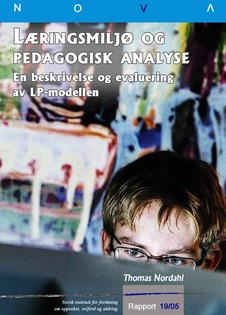Læringsmiljø og pedagogisk analyse.
Working paper

Åpne
Permanent lenke
https://hdl.handle.net/20.500.12199/3209Utgivelsesdato
2005Metadata
Vis full innførselSamlinger
- NIBR notat [1018]
Sammendrag
The project Learning Environment and Pedagogical Analysis (the LP-model) is a study of 14 Norwegian schools during a period of two and a half years. Lillegården kompetansesenter is responsible for the development part of the project, while NOVA, Norwegian Social Research, has conducted the evaluation part. The evaluation is undertaken in the form of a pre-postdesign study with control groups, and both the subject schools and the control groups are monitored at the start of the project and in the end. Reliable questionnaires, representative of the project's objectives, have been employed in the study. None of the participating schools have been incurred extra expenses as a result of their participation in the study. The participating schools had only to reorganize the staff's teaching hours such that the study could be conducted at no extra cost. The project has collected the following results: Students in the participating schools improved their knowledge and skills in Norwegian, mathematics, English and natural and environmental sciences by an average degree of 0.4 points compared to the students in the control group. Students in the participating schools improved their social skills compared to the students in the control group, a fact that resulted in better school behaviour and less tension among the students during the teaching hours. The study showed a lesser degree of conflict among the students in the participating schools and a general decline in bullying behaviour was observed. The teachers in our study had as a starting point the goal to see what the challenges of their teaching work were, trying then in cooperation with other teachers to analyze those challenges. They focus their analysis primarily on the teaching and learning conditions in the schools, and less on the particular student, so that specific measures and strategies, related directly to the particular school, were possible to employ based on reliable research data. The positive results that the subject schools of our study have thus demonstrated, can be related to the teachers' role as more distinct adult figures, having good relationships with their students. Teachers can thus be perceived by the students as authoritative in both being friendly and having good control and structure in the classroom. The study shows that this fact, along with the use of verbal incentives and close cooperation with the parents, contribute to the schools' improvement as a good learning environment. This improvement shown by our study could be related to the systematic and constant application by the teachers of the LP-model. The LP-model contains no ready-made solutions for the teaching staff; it is solely a means which teachers use to arrive at the correct decision in particular cases. The evaluation shows that when teachers analyze their own work systematically and consciously, becoming thus better leaders in the classroom, it will have a positive effect also on the students' learning skills and on the development of their social skills. I denne rapporten presenteres det faglige grunnlaget for LP-modellen og evalueringsresultatene fra utprøvingen av modellen i 14 grunnskoler. Evalueringen er gjennomført som et pre-post-design med kontrollgruppe som omfatter kartlegging ved prosjektstart og i sluttfasen av prosjektet i både prosjektskolene og kontrollskoler. I arbeidet med LP-modellen tar lærerne utgangspunkt i utfordringer i sin egen opplæring der de i samarbeid med andre lærere analyserer seg fram til hva som bidrar til at disse utfordringene eksisterer. Lærerne har her primært søkelyset på situasjonen og omgivelsene i skolen, og i mindre grad på den enkelte elev. På bakgrunn av dette velger lærerne tiltak og strategier i den enkelte skole ut fra forskningsbasert kunnskap om hva som virker og ikke virker. Resultatene av evalueringen viser at elevene i prosjektskolene klart har forbedret sine skolefaglige prestasjoner i sentrale fag som norsk, matematikk og engelsk. Videre har elevene utviklet bedre sosiale ferdigheter enn elevene i kontrollskolene, o gdet er blitt mindre bråk og uro i undervisningen. Disse positive elevresultatene har en sammenheng med at lærerne fremstår som tydelige voksenpersoner med gode relasjoner til elevene. Lærerne oppfattes som autoriteter av elevene ved at de både har et nært forhold til elevene og god kontroll og struktur på undervisningen.